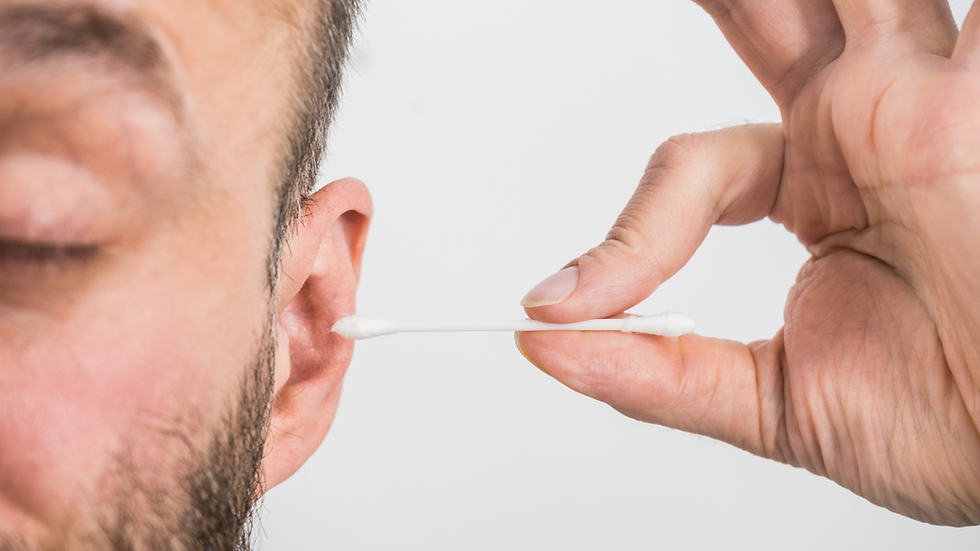Other Causes of Ear Problems
- Victoria Wermers, RN,MSN,FNP, PMHNP
- Sep 18, 2024
- 4 min read
Updated: Jul 5, 2025
Itchy Ears (Fungal Infection) - Dermatitis - Is There a Bug In Your Ear?
Other Causes of Ear Problems are discussed in the following:
Itchy Ears (Fungal Infection-Otomycosis)
Sometimes, itchy ears are caused by a bacterial infection or allergies, but when the itchiness does not respond to antibiotic ear drops or antihistamines (allergy medications like Loratadine, Zyrtec, or Allegra), you need to think about ear fungus (otomycosis). This is a fairly common issue that causes itching of the ear canal. It is especially prominent in people with eczema, psoriasis, diabetes, and immunocompromised people.
Symptoms can include fierce itching of the inner ear, drainage (gray, yellow, thick white, sometimes black), scaling, or flakiness at the entrance to the ear canal, or mixed in with the drainage.

The ear with a fungal infection often looks and acts irritated, like a swimmer's ear (otitis externa). There is not only itching but also sometimes pain and inflammation. Because of this, the problem is often misdiagnosed as a bacterial otitis externa. The patient is given antibiotic/steroid ear drops, which fail to address the problem. The patient returns to the clinic several times with an ear canal infection that is not improving with antibiotic drops (which might even worsen things). There are several different approaches to ear fungus.
First, keeping water out of the ears is
important because moisture causes fungal
growth. That does not mean a person should use Q-Tips to dry them out. Instead, acetic acid drops can help dry them, or gently use a warm hair dryer (on low) about 6 inches away, to remove excess moisture in the ear canal(s).
Over-the-Counter Ear Drops for Itchy Ears
Several over-the-counter ear drops (including herbals) claim to work for ear fungus, but very few have studies to back them up. One, in particular, has pretty good reviews—Hyland's Dry Ear Relief Oil (homeopathic) (this is not an advertisement). It contains several herbs and coconut oil, which the NIH has also found to be among the more effective oils for conquering otomycosis. Many herbs do have antifungal properties, but unfortunately, there are few studies to back them up. A person might do more harm than good.
Natural Remedies for Itchy Ears
There are several possible solutions to help with ear fungus (otomycosis). One of the more common home approaches is mixing acetic acid (vinegar) or hydrogen peroxide and water (in a 1:1 dilution). Instill 5-10 drops into the affected ear 3-4 times daily. Lay on your side with the ear facing upward for several minutes, then dry the outer ear of any excess solution. This can be done for up to a week and may be repeated if the problem returns. Regular vinegar (or even apple cider vinegar) can be used. Hydrogen peroxide may also be used in the same manner (1:1 solution).
If you try the above and are not getting relief, if there is increasing pain and itching, or if the discomfort persists, you should see a healthcare provider. If you want a more reliable treatment, your healthcare provider can prescribe the following antifungal ear drops.
Prescriptive Treatment for Itchy Ears
Hydrocortisone/acetic acid ear drops (for ear canal itching/fungal infections)
Clotrimazole (antifungal) ear drops
Fluconazole (antifungal) ear drops
Occasionally, oral antifungals are used (fluconazole, itraconazole), but these can potentially cause liver problems, so they are rarely prescribed for this.
If it is persistent, a culture may be taken and examined at the lab for a definitive diagnosis.
Dermatitis as a Cause of Ear Inflammation
As mentioned, some people with psoriasis (an immune condition) or eczema (environmental and genetic) develop dermatitis in their ear canals, which can cause a lot of itching. Symptoms may include itching, flaking or scaling, and inflammation/redness of the skin that can extend from the ear (concha) opening into the ear canal. Sometimes, this is easy to see at the opening of the ear canal and can be an ongoing problem without treatment.
For eczema, you can try hydrocortisone cream (or ointment) or Vaseline on the OUTER ear area for three weeks or so. If it is not improving, a healthcare provider can prescribe other prescription creams for the outer ear or steroid drops for the ear canal, depending on the extent of the problem.
See a healthcare provider if you are not improving.
Someone Put a Bug in Your Ear?
This topic is included under ‘Other Causes of Ear Problems’ because we occasionally see patients reporting this unusual sensation. Fortunately, bugs rarely crawl into people’s ears—but it can and does happen. I’ve witnessed patients become visibly distressed (or even a bit ‘buggy’?) when an insect buzzes inside the ear canal. Sometimes, there’s no sound at all—the only clues are ear pain from irritation or a bite, or a visible object deep within the ear.
If you suspect that you have a bug in your ear, you can try to get it out by tilting your head to the side and shaking it. If that fails, you can instill a few drops of oil (olive oil, vegetable oil, or baby oil) in your ear. This approach should kill the bug, which will "float" out of your ear. Alternatively, you can irrigate or flush it out with warm water using a syringe or bulb syringe.
If you cannot remove it or can remove only part of it, if you have a history of chronic ear problems (tubes, punctures, and others), if the ear is very painful, or the sound is driving you nuts, you should head to a healthcare provider for further inspection and treatment.



